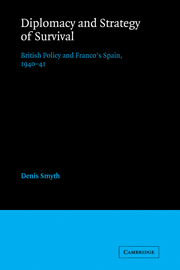Book contents
- Frontmatter
- Contents
- Preface
- Introduction
- 1 Britain and and the birth of Franco's Spain, 1936–39
- 2 Defining a policy
- 3 Opposition
- 4 The Spanish scene
- 5 Strategic diplomacy: September–October, 1940
- 6 Economic diplomacy: September–December, 1940
- 7 The Tangier crisis
- 8 The limits of attraction
- 9 The exhaustion of diplomacy
- Conclusion
- Notes
- Bibliography
- Index
8 - The limits of attraction
Published online by Cambridge University Press: 05 November 2011
- Frontmatter
- Contents
- Preface
- Introduction
- 1 Britain and and the birth of Franco's Spain, 1936–39
- 2 Defining a policy
- 3 Opposition
- 4 The Spanish scene
- 5 Strategic diplomacy: September–October, 1940
- 6 Economic diplomacy: September–December, 1940
- 7 The Tangier crisis
- 8 The limits of attraction
- 9 The exhaustion of diplomacy
- Conclusion
- Notes
- Bibliography
- Index
Summary
The frustration of the British scheme for a joint programme of Anglo-American aid to Spain in late 1940, and the Tangier imbroglio, as a whole, illustrate clearly the combination of influences tending to thwart Hoare's effort to attract Spain into a close political relationship with, and economic dependency upon, Britain. The Spaniards' own wariness of the dangers inherent in too public an intimacy with Germany's enemies was an evident factor. They were already defying that mighty military power by declining to fight on its side. To flaunt political and economic accord with the Reich's foes, in addition to a refusal to enter the lists against the British, could be suicidally provocative. The Spaniards' own truncated will to empire, as expressed in their takeover of Tangier, also made for a conflict of interest with the British. The Americans' sullen suspicion of Spain's future intentions greatly diminished the attractiveness of the economic temptation which Britain might present to the Spaniards. The British, for all their willingness to risk a try at courting Spain with the bait of economic aid were, simultaneously, forced by the very desperate nature of their struggle with Germany, to maintain an alert vigil over the developing strategic situation in the Iberian Peninsula and elsewhere. This constant scanning of the strategic horizon for new signs of menace meant that the entire effort to woo Spain could be hastily interrupted or abandoned, if the apparently threatening circumstances seemed to require preventive British military action.
- Type
- Chapter
- Information
- Diplomacy and Strategy of SurvivalBritish Policy and Franco's Spain, 1940-41, pp. 173 - 216Publisher: Cambridge University PressPrint publication year: 1986

